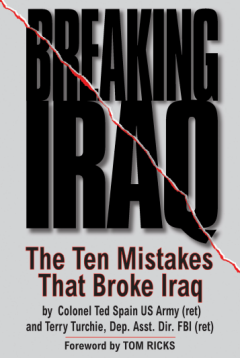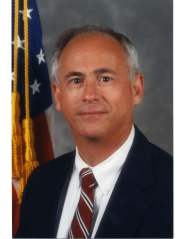A U.S. Army Military Police officer examines document for Iraqis waiting to visit their loved ones detained after the 2003 invasion.
When the Iraq war began 10 years ago Tuesday, Colonel Ted Spain was in the thick of it from the start. He ended up commanding a U.S. Army police brigade in Baghdad for the first year of the war. He presents a down-in-the-weeds picture of what it was like to be on the ground as the initial glow of a successful invasion soured, once it became clear that both the Iraqi police force and U.S. post-war planning weren’t sufficient to keep a post-invasion Iraq calm. He details this in a book — Breaking Iraq: The Ten Mistakes That Broke Iraq — being released on the invasion’s anniversary (he rattles the 10 off on Tom Rick’s blog).
“Our methods of trying to bring the rule of law to Iraq and establish law and order through trust and respect were shoved aside by military and civilian leaders who simply didn’t know what they were doing and had no understanding of the role of law enforcement in a democracy,” he writes. Instead, they “focused on killing the bad guys because that was their comfort zone. They had trained their entire lives for that, and were good at it.” Battleland recently conducted this email chat with Spain, who wrote the book with Terry Turchie, a former top FBI counter-terrorism official:
Why did you write Breaking Iraq: The Ten Mistakes That Broke Iraq now, 10 years after the fact?
I have personal information that few others have, and the ones that do, likely won’t report it because it will make them look bad.
I want Breaking Iraq to be a historical record that can be used for research by others that are attempting to prevent these mistakes in the future. I also wrote it to document what happened, including my analysis of the events, with the benefit of hindsight.
I would have been incapable of writing this when I first retired over eight years ago, I was simply too close to the issues I discuss in the book, and didn’t have the benefit of seeing what others were saying. In many cases they were simply trying to justify their actions.
The years have allowed me to step back, and review the events from a distance. As you will see in Breaking Iraq, I accept responsibilities for my mistakes. I also wrote it to give the commanders and the soldiers under me the credit they deserve, because they performed miracles without adequate equipment, personnel and a clear mission.
Is Iraq broken?
Since I only have access to unclassified information, it appears to be broken, even though it’s in better shape than it was when I left Baghdad in February 2004.
You have to look hard to see what is happening in Iraq today, but there is still a lot of violence. I don’t think you see much in the mainstream media because we have very few conventional soldiers there, mainly Marines guarding the embassy.
Most Americans simply don’t care because it doesn’t affect their daily lives, but it might in the future.
Does a “broken Iraq” mean the U.S. lost the war? Why or why not?
That depends on how one defines “lost.”
We removed Saddam; we ensured Iraq didn’t have weapons of mass destruction, even though Saddam was a one-person weapon of mass destruction.
I don’t think the “Did we lose the war?” part of history has been written yet. If Iraq becomes a sanctuary for terrorists and an enemy of the U.S. in the future, then in my opinion we lost the war. No one should argue that a stable Iraq isn’t in the best interests of the U.S.
My biggest fear is that I live long enough to ever conclude that my 13 soldiers died in vain, not to mention the ones that went home with countless physical and mental issues. There has also been untold damage to the family members and other loved ones of those that served there.
How well did the U.S. military plan for and wage this war?
The plan to wage the war was phenomenal, and the conduct of the ground war was historical.
The timing on when to launch the war was a challenge. President Bush and Secretary Rumsfeld had to deal with the politics; we had to deal with the upcoming heat, the absolute belief we were going to get hit with chemical weapons, and in my case, an inadequate number of soldiers and inadequate quantity and quality of equipment.
It was a humbling experience to be in the countless planning sessions with some of the greatest military minds (I wasn’t one of them) in history. We knew we were going to win the war, we just didn’t know how to win the peace.
How adequate was post-war planning?
From the macro level, the politicians thought we would liberate the Iraqi people, and then hand the government over to the new Iraqi leaders before the end of 2003.
That sounded good at the time and I believed it. From the micro level, during the planning for the invasion, and the conduct of the ground war, as I talk about in Breaking Iraq, I expended all my energy trying to maximize the extremely limited resources I had to support the infantry and armor.
We focused on not letting the enemy prisoners of war slow them down, and to keep their logistical support moving forward.
Based on the war plan I thought I would have sufficient time to determine how best to stand up a new Iraqi police force, once I knew their reaction to our occupation, but I got caught short, time wise.
The war plan called for essentially an encirclement plan to take Baghdad that could last three to four months.
In hindsight, I thought I could reopen the Iraqi police under new management. Baghdad fell much sooner than planned, and I was dead wrong.
If I could do it over, I would have insisted on more intelligence on the senior Iraqi police, but as a nation, and as a military, we didn’t pay much attention to the police. The lack of a legitimate police department contributed to the instability of the country, and the lack of support from most of the Iraqi citizens.
What were the key lessons you learned in researching and writing this book?
My main research involved pouring through countless pages of documents and notes I brought back from Iraq, as well as reading most of the books from the senior civilian and military leaders that I served with.
I brought back all of my personal notebooks, with all of my original notes, in most cases showing the exact time and date of what I was involved in.
I used my personal experience to write about the shortage of military police, the lack of establishing law and order, the struggle to classify the detainees, and the challenges of dealing with the Iraqi police.
I also referred to my personal involvement with the former Brigadier General Janis Karpinski, Lieutenant General Ricardo Sanchez, Secretary Rumsfeld, Ambassador Paul Bremer from the Coalition Provisional Authority, Former New York City Police Commissioner on 9/11 Bernie Kerik, and lesser-known key players.
My co-author, Terry Turchie, is a retired deputy director of the FBI, and he conducted research to get background information on Bernie Kerik, Jim Steele, Ambassador Bremer, and others that I talk about in Breaking Iraq.
What would shock a reader most in your book?
They would be shocked by the inadequate plan for post-war operations.
The lack of military police, coupled with the improper use of some of the ones that I didn’t control, contributed to the Jessica Lynch fiasco, and the slow loss of the “hearts and minds” of the Iraqi people. Readers will also be shocked about the background stories on some of the key characters I was involved in that my co-author Terry Turchie discovered.
Who was the unsung hero, in your mind, of the Iraq war?
This is easy, the American soldier.
My father fought in World War II and was the greatest man I ever knew. I’ll accept that he was part of a great generation, but the men and women in Iraq that I served with are equal to that generation.
They are the unsung heroes. They fought battles every day, many times with inadequate equipment, under the worst of conditions, but we all stood true to our oath to “support and defend the constitution of the United States against all enemies, foreign and domestic.”
Everyone who served under me was a hero. It was me, other senior commanders, senior civilian leaders, and the politicians that failed to plan properly, and in some cases we let my soldiers down.
Who was, on the U.S. side, the villain in terms of what went wrong?
I’m not sure there were any villains.
Nearly everyone there, civilian and military, was trying to make the best out of a chaotic situation. I spent a great deal of time trying to organize that chaos.
As I talk about in Breaking Iraq there were some non-military people I dealt with that perhaps had questionable motivations about why they were there. There were certainly some opportunists that made money on the invasion. They were perhaps the closest to villains, from the U.S. side that I worked with.
What lessons learned should Americans take away from your book?
Americans should always insist on a strong military, which must consist of strong, ethical leaders.
No military plan survives the first contact with the enemy; therefore military leaders must call an audible at the line.
They must possess adaptive leadership ability and the military must never stop trying to purge itself of toxic leaders. If we don’t learn from the mistakes in Breaking Iraq we will repeat them.
This is hard stuff, and the next time we liberate the people of an oppressed nation, they will need a legitimate police force as soon as possible.




![Command Photo[2]](http://nation.time.com/wp-content/uploads/sites/8/2013/03/command-photo2.jpg?w=185)
